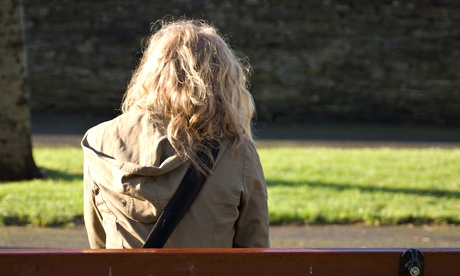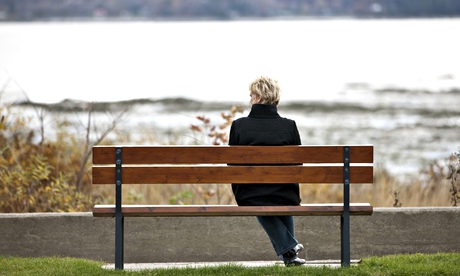'People will forgive you for being wrong, but they will never forgive you for being right - especially if events prove you right while proving them wrong.' Thomas Sowell
Search This Blog
Showing posts with label lonely. Show all posts
Showing posts with label lonely. Show all posts
Sunday, 2 April 2023
Monday, 16 January 2023
Monday, 20 June 2022
Friday, 12 August 2016
Think loneliness is about single people looking for love? Think again
Gaby Hinsliff in The Guardian
It’s hard to feel alone inside a long and happy marriage. But it’s easier than it looks, perhaps, to feel lonely. Last week, Italian police officers responding to reports of screaming and crying inside an apartment in Rome found something unexpected behind the door. Jole and Michele were a devoted elderly couple who had ostensibly got themselves worked up over a sad story on the TV news, but some gentle questioning elicited the fact that both were struggling with terrible loneliness. After 70 years of apparently loving marriage they still had each other, and yet that clearly was not enough.
This being Italy, the officers rather charmingly cooked them a meal of spaghetti with butter and parmesan and stayed to chat, before doing the washing up and posting a flowery account on Facebook of how loneliness can suddenly sweep over you “like a summer storm”. The story went viral because it’s so heartwarming, and yet on second reading it’s also rather unsettling. The lonely are not quite the people we think they are.
It will be 20 years ago this summer that the first Bridget Jones novel was published, a timely reminder to ignore the spectacularly awful sequels and remember just how neatly the original skewered some of the myths about lonely singleton life.
Bridget was famously terrified of dying alone and forgotten, but ironically the one thing she wasn’t was lonely: she was riotously surrounded by friends and family, even if they did all keep harping on about her getting a proper boyfriend. It’s smug marrieds who can all too easily collapse in on themselves, severing old friendships they will come to regret in the process. (Anyone who thinks that having a baby means you’ll never feel alone again, meanwhile, has yet to find out how it feels to be home with a howling infant, desperately trying to engage the postman in conversation because he’s the only sentient adult you’ll see for hours.)
It’s all too easy to become consumed by family life and then wake up in middle age, ostensibly at the centre of a rich and busy life, struggling to remember your last meaningful conversation. That feeling may not be loneliness yet, but it’s a first step on the road.
For while the cavernously empty feeling endured by the bereaved or unwillingly single can indeed be a terrible thing, and life-shortening to boot, it’s not the only kind of loneliness. A recent University of California study found that while almost half of its elderly subjects confessed to feeling lonely at times, only 18% of them actually lived alone.
Unhappy marriages, atrophying into long silences and separate lives, might have something to do with that, but the story of Jole and Michele suggests something else: a distinct kind of loneliness stemming not from the absence of significant others but from a feeling of disconnection with the wider world, a sense that you’re no longer part of something shared and human. Is it just a coincidence that the Italian couple’s crisis seems to have been provoked by a run of news stories – violent attacks, abuse at a kindergarten – revealing human nature at its coldest?
Fleeting loneliness comes to all of us occasionally, but it solidifies into something deeper and darker for those who start to perceive the world as a harsh and hostile place, one that wouldn’t welcome efforts to connect even if you try. It’s that nagging feeling of rejection, of not belonging or standing somehow apart from others, that is the true hallmark of feeling lonely in a crowd, and it’s by no means the preserve of the old.
Interestingly, a recent Brunel University study of over-50s found more than half of those identifying themselves as lonely had been that way for over 10 years, suggesting the feeling had become part of the fabric of their lives. (The same study, by the way, found levels of loneliness had barely changed since the second world war; so much for the idea of a modern epidemic, caused by fragmenting and hectic modern family lives.)

The future of loneliness
So perhaps it’s not so surprising that this week’s obituaries of the fabulously wealthy Duke of Westminster, a father of four, should describe him as “lonely”. Immense wealth can of course be isolating – although the money clearly didn’t make the duke unhappy enough to get rid of it, or indeed to eschew the family tradition of minimising inheritance tax liabilities – but in Gerald Grosvenor’s case something else seems to be going on. What emerges is a picture of a man struggling all his life with feelings of inadequacy and anxiety, worried that he had done nothing to live up to the reputation of those ancestors who built his unearned fortune. Bullied at school, he reportedly left Harrow without one proper friend.
And if you can’t bring yourself to feel sorry for a billionaire, the blunt truth is that not all lonely people are lovable old grannies who tug at your heartstrings. An unhappy few have pushed others away with their self-destructive behaviour and are now paying a high price for it; some have struggled bitterly all their lives with the art of making friends, never quite mastering social norms. How much of the late-night bile spewed on social media simply reflects the envy and frustration of those who see other people happily connecting all around them and just don’t quite know how to join in? Loneliness has its dark side, one not so easily solved by more visits from the grandchildren or well-meaning volunteer “befrienders” popping in for chats over coffee.
For Jole and Michele, at least, perhaps there will be a happy ending. Now their story has been made public, perhaps surviving relatives or old friends will rally round, and if nothing else the knowledge that strangers worldwide are now asking how they can send letters or visit must do something to restore their faith in human nature.
Yet while a little kindness goes a very long way, it’s too easy to pretend loneliness can all be solved by a few more companionable plates of spaghetti. It makes for a less heartwarming story but the truth is that, like the poor, the lonely may to some degree always be with us – even, perhaps, when they’re ostensibly with someone else.
It’s hard to feel alone inside a long and happy marriage. But it’s easier than it looks, perhaps, to feel lonely. Last week, Italian police officers responding to reports of screaming and crying inside an apartment in Rome found something unexpected behind the door. Jole and Michele were a devoted elderly couple who had ostensibly got themselves worked up over a sad story on the TV news, but some gentle questioning elicited the fact that both were struggling with terrible loneliness. After 70 years of apparently loving marriage they still had each other, and yet that clearly was not enough.
This being Italy, the officers rather charmingly cooked them a meal of spaghetti with butter and parmesan and stayed to chat, before doing the washing up and posting a flowery account on Facebook of how loneliness can suddenly sweep over you “like a summer storm”. The story went viral because it’s so heartwarming, and yet on second reading it’s also rather unsettling. The lonely are not quite the people we think they are.
It will be 20 years ago this summer that the first Bridget Jones novel was published, a timely reminder to ignore the spectacularly awful sequels and remember just how neatly the original skewered some of the myths about lonely singleton life.
Bridget was famously terrified of dying alone and forgotten, but ironically the one thing she wasn’t was lonely: she was riotously surrounded by friends and family, even if they did all keep harping on about her getting a proper boyfriend. It’s smug marrieds who can all too easily collapse in on themselves, severing old friendships they will come to regret in the process. (Anyone who thinks that having a baby means you’ll never feel alone again, meanwhile, has yet to find out how it feels to be home with a howling infant, desperately trying to engage the postman in conversation because he’s the only sentient adult you’ll see for hours.)
It’s all too easy to become consumed by family life and then wake up in middle age, ostensibly at the centre of a rich and busy life, struggling to remember your last meaningful conversation. That feeling may not be loneliness yet, but it’s a first step on the road.
For while the cavernously empty feeling endured by the bereaved or unwillingly single can indeed be a terrible thing, and life-shortening to boot, it’s not the only kind of loneliness. A recent University of California study found that while almost half of its elderly subjects confessed to feeling lonely at times, only 18% of them actually lived alone.
Unhappy marriages, atrophying into long silences and separate lives, might have something to do with that, but the story of Jole and Michele suggests something else: a distinct kind of loneliness stemming not from the absence of significant others but from a feeling of disconnection with the wider world, a sense that you’re no longer part of something shared and human. Is it just a coincidence that the Italian couple’s crisis seems to have been provoked by a run of news stories – violent attacks, abuse at a kindergarten – revealing human nature at its coldest?
Fleeting loneliness comes to all of us occasionally, but it solidifies into something deeper and darker for those who start to perceive the world as a harsh and hostile place, one that wouldn’t welcome efforts to connect even if you try. It’s that nagging feeling of rejection, of not belonging or standing somehow apart from others, that is the true hallmark of feeling lonely in a crowd, and it’s by no means the preserve of the old.
Interestingly, a recent Brunel University study of over-50s found more than half of those identifying themselves as lonely had been that way for over 10 years, suggesting the feeling had become part of the fabric of their lives. (The same study, by the way, found levels of loneliness had barely changed since the second world war; so much for the idea of a modern epidemic, caused by fragmenting and hectic modern family lives.)

The future of loneliness
So perhaps it’s not so surprising that this week’s obituaries of the fabulously wealthy Duke of Westminster, a father of four, should describe him as “lonely”. Immense wealth can of course be isolating – although the money clearly didn’t make the duke unhappy enough to get rid of it, or indeed to eschew the family tradition of minimising inheritance tax liabilities – but in Gerald Grosvenor’s case something else seems to be going on. What emerges is a picture of a man struggling all his life with feelings of inadequacy and anxiety, worried that he had done nothing to live up to the reputation of those ancestors who built his unearned fortune. Bullied at school, he reportedly left Harrow without one proper friend.
And if you can’t bring yourself to feel sorry for a billionaire, the blunt truth is that not all lonely people are lovable old grannies who tug at your heartstrings. An unhappy few have pushed others away with their self-destructive behaviour and are now paying a high price for it; some have struggled bitterly all their lives with the art of making friends, never quite mastering social norms. How much of the late-night bile spewed on social media simply reflects the envy and frustration of those who see other people happily connecting all around them and just don’t quite know how to join in? Loneliness has its dark side, one not so easily solved by more visits from the grandchildren or well-meaning volunteer “befrienders” popping in for chats over coffee.
For Jole and Michele, at least, perhaps there will be a happy ending. Now their story has been made public, perhaps surviving relatives or old friends will rally round, and if nothing else the knowledge that strangers worldwide are now asking how they can send letters or visit must do something to restore their faith in human nature.
Yet while a little kindness goes a very long way, it’s too easy to pretend loneliness can all be solved by a few more companionable plates of spaghetti. It makes for a less heartwarming story but the truth is that, like the poor, the lonely may to some degree always be with us – even, perhaps, when they’re ostensibly with someone else.
Tuesday, 12 August 2014
One in 10 do not have a close friend and even more feel unloved, survey finds
Study by relationship counsellor Relate finds a divided nation with many left without vital support of friends and family

Millions of people in the UK do not have a single friend and fewer still feel loved. Photograph: keith morris / Alamy/Alamy
Millions of people in the UK do not have a single friend and one in five feel unloved, according to a survey published on Tuesday by the relationship charity Relate.
One in 10 people questioned said they did not have a close friend, amounting to an estimated 4.7 million people in the UK may be leading a very lonely existence.
Ruth Sutherland, the chief executive of Relate, said the survey revealed a divided nation with many people left without the vital support of friends or partners.
While the survey found 85% of individuals questioned felt they had a good relationship with their partners, 19% had never or rarely felt loved in the two weeks before the survey.
"Whilst there is much to celebrate, the results around how close we feel to others are very concerning. There is a significant minority of people who claim to have no close friends, or who never or rarely feel loved – something which is unimaginable to many of us," said Sutherland.
"Relationships are the asset which can get us through good times and bad, and it is worrying to think that there are people who feel they have no one they can turn to during life's challenges. We know that strong relationships are vital for both individuals and society as a whole, so investing in them is crucial."
The study looked at 5,778 people aged 16 and over across England, Wales, Northern Ireland and Scotland and asked about people's contentment with all aspects of their relationships, including their partners, friends, workmates and bosses. It found that people who said that they had good relationships had higher levels of wellbeing, while poor relationships were detrimental to health, wellbeing and self-confidence.
The study found that 81% of people who were married or cohabiting felt good about themselves, compared with 69% who were single.
The quality of relationship counts for a lot, according to the survey: 83% of those who described their relationship as good or very good reported feeling good about themselves while only 62% of those who described their relationship as average, bad or very bad reported the same level of personal wellbeing.
The survey, The Way We Are Now 2014, showed that while four out of five people said they had a good relationship with their partner, far fewer were happy with their sex lives. One in four people admitted to being dissatisfied with their sex life, and one in four also admitted to having an affair.
There was also evidence of the changing nature of family life – and increasing divorce rates – in the survey, which found that almost one in four of the people questioned had experienced the breakdown of their parents' relationship.
When it comes to the biggest strains put on relationships, a significant majority (62%) cited money troubles as the most stressful factor.
The survey also found that older people are more worried about money, with 69% of those aged 65 and over saying money worries were a major strain, compared with only 37% of 16 to 24-year-olds.
When it comes to employment, many of those questioned had a positive relationship with their bosses, but felt putting work before family was highly valued in the workplace.
Just under 60% of people said they had a good relationship with their boss, but more than one in three thought their bosses believed the most productive employees put work before family. It also appears that work can be quite a lonely place too: 42% of people said they had no friends at work.
Nine out of 10 people, however, said they had a least one close friend, with 81% of women describing their friendships as good or very good compared with 73% of men.
Monday, 23 June 2014
Loneliness is one thing. A happy loner quite another
Britain may well be 'Europe's loneliness capital', but being happily alone by choice is quite another matter

Isolated… or just enjoying her own company? Photograph: Pierre Desrosiers/Getty Images
There used to be a fashion for scaremongering surveys about single women, saying things like: "Eight out of 10 women are going to die alone, surrounded by 17 cats." But to that I would mentally add: "Or it could all go horribly wrong." To my mind, aloneness never necessarily equated with loneliness. It wasn't a negative, something to be avoided, feared or endured.
Now a survey from the Office for National Statistics says that "Britain is the loneliness capital of Europe". Overall, Britons are less likely to have people they can turn to in a crisis or to feel close to neighbours. On this last point, we came 26th out of 28 European countries – beating Denmark and France (but they scored higher in other areas).
However, Britain was better than average in areas such as feeling that life was generally worthwhile. And though we did come near bottom on having people to turn to in a crisis, there were still 88.7% who could turn to someone. Slovakia's score was nearly 100%, but that's just showing off. Joking apart, if the truly lonely in Britain are to be identified and helped, then the first step would be to stop lazily lumping them in with the contented-alone.
I sometimes think of myself as a natural loner, though, in my case, this could just be a cover for being a sullen, unsociable, misanthropic cow who was warped by reading too much as a child. The upshot is that "alone" doesn't bother me much. But, then, there are two types of solitude – voluntary and enforced, the latter being a killer.
Past studies have reported the debilitating impact of loneliness, one stating that, for older people, it could be more deadly a factor than obesity. Such loneliness is caused by myriad factors – disability, unemployment, economic stress, mental illness, family breakdown, relocation and so on. Few would want to suffer it.
Then there is the other type of "alone". This study could just as well be interpreted as saying that many Britons are self-reliant problem-solvers, respectful of others people's privacy – and what's wrong with that? Isn't this the modern British definition of neighbourliness: not over-chummy and intrusive, but friendly, considerate and, most importantly, happy to sign for your Amazon parcels?
Now I'm being flippant. Of course you'd hope that people would help each other out in a crisis. However, generally, things such as "neighbourliness" seem defined by personality types. That's why some people go to London, are shocked by its standoffish ways and leave, while others like myself (escapees from villages) relish the freeing anonymity.
Likewise, while these days social media et al provides a sense of ersatz "community" without human interaction for those who want it (the equivalent of the television left on "for company"?), some people don't even want or need this.
Odd, then, that it's usually loners who are viewed with pity, condescension or suspicion. But why? Britain is an overstuffed, teeming little rock. It makes sense that, just as some people will be sociable, others will adopt the "island mentality" of standing alone and neither is right or wrong.
Still, the feeling persists that sociability is a skill, while the opposite casts a person as a loser or a weirdo – someone who's going to end up walking down a high street wearing a bandana, firing guns at those who've "wronged" them.
Personally, I'd be more likely to distrust people who can't bear time with themselves. What's wrong with them that they can't abide their own company – what are they trying to hide in the crowd?
This is what I take from these kinds of surveys – that there are the lonely, and there are the alone. Seemingly the trick is to reach out to the group who truly need help, rather than getting them mixed up.
Wednesday, 26 February 2014
Loneliness should be recognised as a signal of poverty in today's Britain
Poor social bonds damage people's employment prospects, living standards and wellbeing. Iain Duncan Smith, take note

Evidence suggests that people lacking strong relationships are more likely to have poor physical and mental health. Photograph: PhotoAlto/Alamy
Time to add loneliness to William Beveridge's famous list of "giant evils" in society. In today's Britain, people are impoverished by weak connections with, and minimal support from, family and friends. Iain Duncan Smith, the secretary of state for work and pensions, will announce this week new indicators to measure child poverty . Poor social networks should be included as a contributor to and signal of poverty.
Poor social bonds damage people's employment prospects, their living standards and their wellbeing. The demands of the modern labour market, especially for those on low incomes who are more likely to work night shifts and weekends, are often in conflict with the opening hours of public services. Sometimes formal childcare is just too expensive. Without support from family and friends, people are more likely to struggle in – or, worse, drop out of – the labour market.
As the Nobel prize-winning psychologist Professor Daniel Kahneman shows, our happiness derives most from strong relationships, especially with loved ones. A growing body of evidence shows that those without strong relationships are more likely to have poor physical and mental health outcomes, including increased propensity to depression, sleep deprivation, problems with the cardiovascular and immune systems, early morbidity and even dementia.
Lamentably, social isolation seems to be on the increase. Single-person households have doubled over the past half-century. Time-use surveys indicate that people are spending more time working and looking after their own children than some decades ago, squeezing time for community and recreational activity. About half of all people in a recent poll said that they believed people were getting lonelier in general, and 11% had sought help for feeling lonely.
When loneliness is combined with material deprivation, the result is toxic. A cycle of worklessness, indebtedness and depression is so much harder to escape. Policymakers need to focus resource and attention on these people. So, the current indicators of poverty should seek to establish the extent of social support received. For example, when identifying income through the annual Households below average income survey, all levels of financial support from parents should be captured. Data on the regularity of practical support – from childcare to food shopping – could also be assessed.
Professionals such as health visitors need to focus efforts not only on social groups traditionally most likely to be associated with social exclusion – those on low income, teenage mothers – but also those identified as having poor social networks. Welfare policies need to be designed in such a way as to ensure claimants are more likely to benefit from the support of their wider family. When allocating social housing, councils could take more into account proximity to family and close friends. Equally, policies such as the removal of the spare room subsidy need to be reconsidered where they disrupt familial support, for example the provision of overnight childcare by grandparents.
Strong social networks are an important part of the battle against poverty. But so are diverse social networks. Character, aspirations and opportunities are more likely to be enhanced with exposure to different social environments. Indeed, the Equality of Opportunity Project in the US has shown that for two children with parents on the same income and with the same educational qualifications, the child who lives in a more mixed socio-economic neighbourhood is likely to experience higher social mobility. OECD evidence has shown that children from low-income backgrounds are likely to achieve higher educational results when they are in schools with children from higher socio-economic backgrounds. We need innovative thinking around creating more socially mixed public service institutions and communities.
Duncan Smith is right to seek a richer understanding of poverty and its causes. Social isolation and loneliness are a growing scourge that should be understood as a major factor contributing to impoverishment in modern Britain. To support people in poverty, to help them escape it, policy is needed to enable them to foster stronger and more diverse social networks.
Subscribe to:
Comments (Atom)

